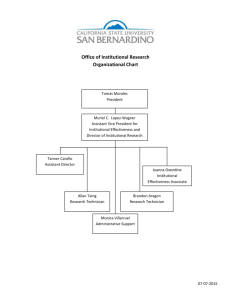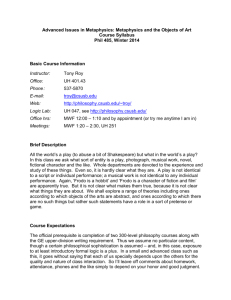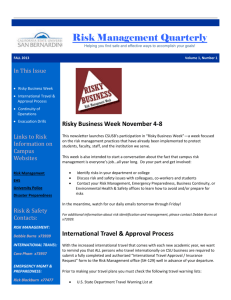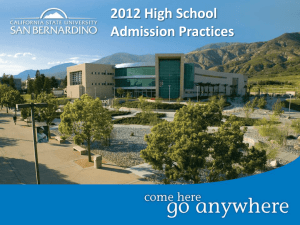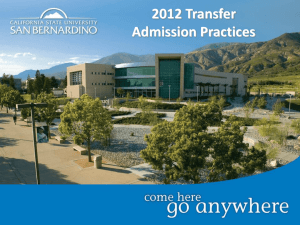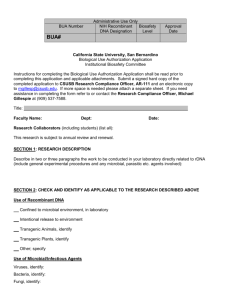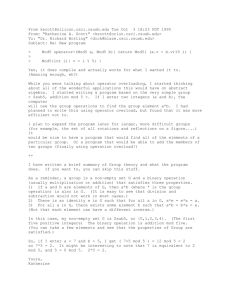Welcome to CSUSB! On behalf of our students, staff, and faculty, I
advertisement
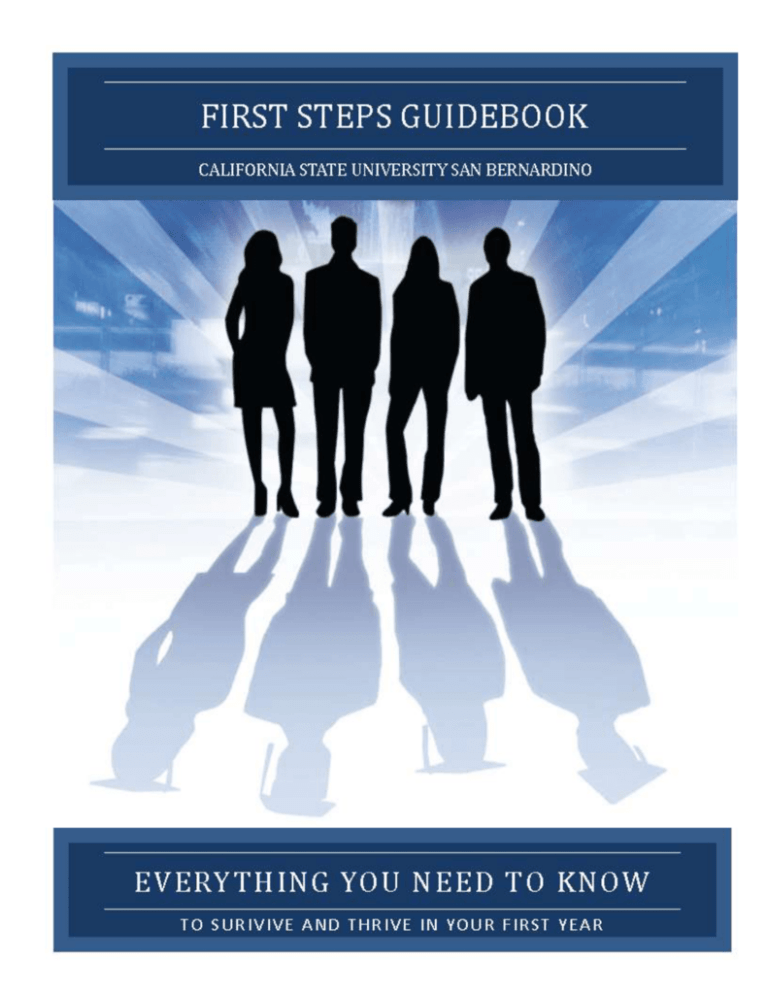
Welcome to CSUSB! On behalf of our students, staff, and faculty, I would like to express our congratulations for taking your first steps toward your college degree, as well as our appreciation for your choice to take those steps with us here at CSUSB. I hope you will find the next four years to be a truly amazing journey, full of new friends, new experiences, new challenges, and new knowledge. Please know that campus staff, faculty, and administrators are all here to support you during your first year and beyond. If you are unsure of where to turn, you are always welcome in the Office of Undergraduate Studies. We will help guide you to where you need to be. This document is intended to provide you with some guidance on important considerations that will get you on the right track to graduation and ensure you don’t miss out on any key opportunities available to you here at California State University San Bernardino. I advise you to keep it with your important CSUSB information and reference it regularly. If you misplace it, you can find an electronic copy on the website for the Office of Undergraduate Studies (http://www.ugs.csusb.edu/docs/general/fsguide.doc). It is organized to address issues related to: Academic Success Engagement, Belonging, and Well-Being Career Pathways Navigating College Life Important Policies to Know You have begun an extraordinary journey, and we are excited to embark upon it with you. Best of luck in the fall and far, far beyond! Sincerely, J. Milton Clark Associate Vice President and Dean Undergraduate Studies 2 Before Classes Start… Academic Success Take the English Placement Test (EPT) and Entry Level Math (ELM) exam, if required Take Early Start courses in English and/or Math, if required Complete Directed Self-Placement (DSP) for English to help determine and choose the best initial English placement for you. English placement is no longer determined solely by the EPT but is based on your own assessment of your reading and writing habits and skills. Purchase a copy of the University Bulletin (sometimes called The Catalog) from the Coyote Bookstore Use the Bulletin to familiarize yourself with your major requirements. If you are considering multiple majors, look at the majors you are considering. This is one step in ensuring the major you have chosen is a good fit for you. If you look at the requirements for your major and think “Ugh!” then you may want to think about alternatives. Consider taking University Studies (USTD) 100: Freshman Seminar your first quarter. Students who participate in this seminar have higher success rates than students who do not take this supportive seminar intended to get freshmen off on the right foot at CSUSB. Consider taking University Studies (USTD) 77: Adjunct (or Supplemental Instruction) Courses. These classes are offered alongside selected courses which typically pose freshman and sophomore students extra challenges with regard to grade outcomes. For more information, stop by the Supplemental Instruction table during the Programs and Services fair at SOAR or call 909-5377320. Know if you are eligible for focused services and resources at CSUSB and look into the requirements needed to participate. o Student Assistance in Learning (SAIL) is a federally-funded TRIO Student Support Services project which has served nearly 4000 students at CSUSB since 1981. The goal of the program is to increase the college retention and graduation rates of low-income, firstgeneration and disabled students. o Services to Students with Disabilities (SSD) provides free and confidential services to students with a verified temporary or permanent disability. The mission of SSD is to ensure that reasonable accommodations are provided to allow equal opportunities for individuals with disabilities at CSUSB and to promote disability awareness throughout the CSUSB campus and local community. o Veterans Success Center provides services to active duty, reserve, and former military personnel. Engagement, Belonging, and Well-Being Attend Student Orientation, Advising, and Registration (SOAR). Make the most of this event by meeting your new classmates, connecting with student groups that interest you, and learning about support services available to you! Attend special program orientations (International Students, EOP, etc.) Consider special learning communities (Honors Program, Living-Learning Communities in Housing, etc.) and apply! 3 Career Pathways Engage with faculty, advisors, students, and staff at SOAR—use this time to begin conversations around your major/career of choice or about the majors/careers you are considering! Navigating College Life Obtain your Coyote ID. This student ID permits you to use the library, classrooms/labs, attend athletic events, print in the library and computer labs, etc. You will have opportunities to get your Coyote ID at SOAR. Check your MyCoyote Account Weekly and MyCoyote Email Daily. ALL important CSUSB communications will come to you via these two sources. If you aren’t checking, you could be missing something related to registration, financial aid, fee payment or other topics that will impact you significantly! Read all CSUSB correspondence carefully and ask questions if you have any. There isn’t a single person on campus who hasn’t needed help at some point—don’t feel badly if you need to ask questions! Understand how and where to pay your fees, both online and in person. http://admnacct.csusb.edu/bursar_fees_AY11-12.htm#feeprocedures Obtain a Parking Pass if you need one. https://adminfin.csusb.edu/parkingpermits/ Budget for the upcoming year, whether you do it alone or with family members. Make sure you understand all the costs for which you will be responsible! Know where your classes are before the first day! After registering for classes but before the first day, use your schedule to map out your days of class. Don’t be the person who shows up late on the first day because you couldn’t find the building or room. Understand how to calculate your GPA and how Credit/No Credit courses or other grading policies can impact your grade point average! Grade policies and information can be found on pages 51-52 of the University Bulletin (Catalog). Know that if you are taking 3 courses but two of those courses are Credit/No Credit, your entire GPA will be determined by the one graded class. Example: Final Grades: ENG 102 Cr (Credit) MATH 80 Cr (Credit) BIOL 100 D (1.00) Term GPA: 1.00 Important Policies to Know Census Date refers to two critically important deadlines for students. It is in the third week of each quarter—check the Academic Calendar in the Course Schedule or online for exact dates. Census date refers to the date each quarter which marks the LAST DAY a student can add a class (by permit only—online registration closes earlier) and the LAST DAY a student can drop a class without a record on the student’s transcript. Dropping or Withdrawing from Class(es) There are several types of drops and processes related to 4 dropping courses. The following four types of drops are detailed in the University Bulletin and in the Class Schedule for each quarter. Students should read the details in those publications carefully in order to fully understand when and for what reasons they may drop a course themselves or be dropped by an instructor. It is VERY important for you to understand this information well, as you never know what may happen in a given quarter. If you want to drop a class, you MUST undertake the process. Do NOT just stop attending classes. This will result in a failing grade on your record. The first three drops are all initiated by the student. The final one may be initiated by the instructor. o Dropping a single class (or classes) o Retroactive withdrawal o Withdrawal (Dropping after census date) o Administrative Drops Academic Good Standing You must maintain a cumulative GPA of 2.0 in order to be considered in academic good standing. Academic Probation A student is subject to academic probation if at any time the cumulative GPA at CSUSB OR the cumulative GPA for all college work attempted drops below 2.0. Mandatory Basic Skills Students MUST complete the first-year composition course AND any required developmental work in Mathematics (courses numbered below 100) during the first year of enrollment (ending June 30). Failure to meet these requirements will result in the ending of matriculation at CSUSB. Course Repeats You can repeat courses in which you received below a C; however, there are limits to the number of times you can repeat an individual course (3), the number of units you can repeat for “grade forgiveness” (24), and the number of units beyond 24 that you can repeat with both grads averaged (18). o Grade forgiveness for a repeated course is by petition only. If the petition for grade forgiveness is approved, the new grade replaces the former grade in terms of GPA calculation. Petitions should be filed after the completion of the coursed used to discount the previous course. Students are strongly encouraged to speak with an advisor before repeating a course for grade forgiveness to ensure that the student is eligible to repeat that course to discount the grade. 5 Your First Year at CSUSB… Academic Success Plan to successfully complete your General Education requirements from Category A in your first year, unless otherwise recommended by your major department. These courses will provide you with learning in and knowledge of the core skills required for college success. o GE A-1: Written Communication (ENG 104A, 104B, 106, OR 107) o GE A-2: Oral Communication (COMM 120 OR HON 104C*) o GE A-3: Mathematics (MATH 110, 115, 120, 192, OR 211) o GE A-4: Critical Thinking (COMM 180, HON 104A*, MATH 180, PHIL 105, PHIL 200, PSYC 105, OR SOC 180) GO TO CLASS! Attendance correlates very strongly with final grades. You are responsible for engaging with professors and in your coursework in ways that ensure understanding of the material. Professors can (but are not required to) administratively drop you from classes if you miss two consecutive class periods in the first three weeks of classes, so it is very important you attend! Participate in class. Engaged learners get more out of class time and generally perform better than those who do not participate regularly. Asking questions is one hallmark of an engaged learner, even if you are concerned that others might already know the answer. If you don’t know something, ask. Make time to meet with your professors during office hours. Clarify points, ask for assistance, or even just say hello and let them know you are enjoying the class. It is important that you engage your professors well before the last week of classes when you are nervous about grades. Building these relationships early can have a significant impact on your success in college. Have confidence in your ability to connect with faculty and staff--remember that professors and administrators were in your shoes once too! Understand the study habits required for success in college. It is generally expected that you will study 2-3 hours outside of class for every hour you spend inside the classroom. This means a 12 unit courseload will require 24-36 hours of study time outside of class per week. Your first quarter is not a good time to test out the minimum amount of work you need to do. Find your performance ceiling, not your performance floor! Engage your academic support resources as soon as you feel uncertain about your understanding in a class. The quarter passes by quickly, and the sooner you seek help, the better you will do! o The Learning Center (UH 351) offers free walk-in and group tutoring for many undergraduate courses, as well as study skills information and tutoring. There are also computer labs available for use. Website for hours and services: www.ugs.csusb.edu/lc. o The Writing Center (UH 387) offers assistance by appointment with writing projects of all types, including essays, lab reports, speeches, presentations, scholarship or graduate school applications, etc. Website for hours and services: www-ugs.csusb.edu/wc/. Utilize the Bulletin, major roadmap(s), and suggestions from academic advisors to build a 4-year plan for graduating. Ensure that you understand all the requirements necessary for graduation and how long it will take you to complete your degree. If you will not complete your degree in four years, do 6 not worry! Building a four-year plan will provide you a map to the most efficient path to graduation, even if that means it is a 4.5 year plan. Be sure to ask an advisor to look at your four-year plan to ensure everything is covered. Engagement, Belonging, and Well-Being Get yourself a mentor to guide you through your first year! A good place to begin is the Faculty/Student Mentoring Program (F/SMP) which can provide you with an upper-division student who is speciallytrained to guide you through the first year of college. Website: http://www-ugs.csusb.edu/mentor/. Your course professors can also become great mentors! Get to know them by visiting them during their office hours. They have lots of information to share about their field of study and research interests. Become involved in one or more clubs or organizations. There are more than 100 unique student groups on campus, and one of them is probably calling your name. Students who are engaged and feel connected to their campuses generally persist to their degrees at higher rates, partly because they connect to more resources along the way! http://studentleadership.csusb.edu/ClubsOrgs/index.htm. Get involved in meaningful community service and “Leave Your Paw Print.” The office of Community University Partnerships (CUP) offers internships and other service-learning opportunities, often to schools or community organizations. Participating in such opportunities will enhance your understanding and application of relevant course content and enhance your sense of civic responsibility. Plan to attend the annual Community Engagement and Volunteer Service Fair in the fall to learn more about ways that you can impact our local community and gain additional experience to prepare for your career. http://cup.csusb.edu/students.html Attend at least one campus event per quarter. Attend a lecture, a theatre production, art show, concert or athletics event. Bring a friend or family member…or meet new people when you arrive! Improve your social skills and broaden your understanding of people who differ from you in some way. Your future career (and quality of life!) will likely rest upon your ability to communicate effectively with other people. College is the perfect time to learn about the many ways people are different from and similar to one another! Your first job is NOT the perfect time to learn these important skills. Eat right, sleep well, and exercise regularly. Not only will these simple activities keep you healthy physically, but they will decrease your stress levels and improve your ability to cope with challenges when they come your way. The Student Recreation Center offers a wide variety of exercise equipment, classes, and intramural sports which are already paid for by your tuition and fees. o No time? Consider contacting The Learning Center about a time-management workshop! Utilize the Student Health Center. Feeling sick? Need a prescription filled? As a CSUSB student, you have access to affordable health care paid for by your tuition. http://healthcenter.csusb.edu/ Utilize the Psychological Counseling Center. Stressed? Depressed? Problems with family members or a partner? The PCC provides a multitude of services including group and individual counseling, referrals, outreach, and wellness workshops. There are available services whether the challenge you are facing is great or small. http://psychcounseling.csusb.edu/ Career Pathways Find out about organizations on campus related to your major or career path and get involved! 7 Begin building relationships with professors in your major department. They will be guiding you along your path and may provide you with opportunities to conduct research or other projects when you are an upper-division student. Look at the variety of services available on the Career Development Center website (www.career.csusb.edu) and visit the Career Development Center (UH 329) at least once! Whether you need to talk to someone about your current major, have no idea what major you want to choose, are unsure of your career path, or want to work on your resume for your first college summer job, the Career Development Center can help you at each and every step. Navigating College Life Purchase textbooks (hard copy or electronic), or other course materials within the first day or two of classes and ensure you have supplies such as notebooks and writing materials BEFORE the first day of class. If you are having trouble buying your textbooks or course materials, it is important to plan a course of action that will allow you to regularly begin using your textbooks before the first week of class is over. It is important not to miss the early material! If your classes use Blackboard, Moodle, or other online formats, make sure you know how to log in and effectively use the materials and community-oriented aspects involved. You need to reapply for financial aid and many scholarships each year. Don’t miss the deadlines (which you won’t do if you are checking your MyCoyote Account Weekly and MyCoyote Email Daily) and make sure you understand the processes to continue any scholarships you are currently receiving. The priority Free Application for Federal Student Aid (FAFSA) filing deadline is March 1! Know your campus resources! There is support on campus for almost any question or need you have. Sometimes the hard part is knowing where to ask your question. Don’t let that uncertainty stop you! Consider the Bulletin, Schedule of Classes, and CSUSB website as resources such as the Student Survival Guide at http://survivalguide.csusb.edu/, but never hesitate to ask your questions in person. If you are absolutely unsure of where to start, you can contact the Office of Undergraduate Studies as a starting point. Continue to check your MyCoyote portal weekly (mycoyote.csusb.edu) and your MyCoyote email daily. THIS IS VERY IMPORTANT! All critical information the University needs you to know, both general and specific to you, is disseminated via one or both of these methods. What classes are you REALLY registered for? Do you have holds that will keep you from registering? Do you know your registration date and time? What is the status of your financial aid? How did you do in your classes? Are you required to see an advisor before registering? All this information is conveyed via the MyCoyote portal and/or your MyCoyote email. SEE AN ACADEMIC ADVISOR. In many instances, no one will require you to see an advisor in the first year, but that doesn’t mean you shouldn’t do it anyway. Plan to meet with an advisor at least once during the first year and more than once if possible. Campus-wide advising information can be found at http://advising.csusb.edu/. Become familiar with the website and resources on the Advising and Academic Services website (http://www-ugs.csusb.edu/advising/), as there are many valuable links and materials there that will assist you in finding the appropriate advisor and in navigating academic policies and processes. The staff in Advising and Academic Services are also always open to your questions if you don’t know where to turn! When you get information or directions about important issues in college (or in life), you should always 8 keep important materials and make notes about when and to whom you spoke about each topic. This way if there is ever a question, you will know what office or individual gave you various pieces of information and you can clearly state what steps you took and why. Important Policies to Know Major Declaration: You will need to declare a major by the time you successfully accumulate 90 units of credit. This policy is in place to ensure all students begin a sequence of study in a timely manner that will allow for graduation within a reasonable time frame. Whether you enter as an undeclared student or you are uncertain about the major you have currently declared, you should plan to take steps toward choosing or solidifying your decision NO LATER than the 90 unit mark, preferably before. Key sources of assistance in making this decision are: o Advising and Academic Services (UH-380) o Departmental Advising o Career Development Center (UH-329) Super Senior Policy: You may be thinking “I’m a first year student—why would I need to think about the Super Senior Policy?” It’s because the decisions you make now will ultimately impact your future, particularly with regard to taking unneeded coursework. Exploration is a normal part of the college process, but you need to understand how much exploration room there is in your plan! If your major plus general education adds up to 198 units, then you have a full plan, even without taking any electives. The Super Senior policy addresses students once they accumulate 220 units and can significantly impact your options. Being a Super Senior can impact your ability to receive financial aid, the courses you will be allowed to select at that point, and can even result in you being “forced” to graduate if you have completed all degree requirements for ANY single degree, even if it is not the major you prefer. Make wise, informed decisions about courses now, so that you don’t have to worry about the Super Senior policy later. Revisit the policies from earlier in this document! They will remain important for you throughout your career at CSUSB. Remember to check your MyCoyote Account Weekly and MyCoyote Email Daily. Finally, enjoy the next four years of your life to the utmost. 9 Important Phone Numbers Office Location Number Academic Computing & Media Admissions & Student Recruitment Bookstore Career Development Center Children’s Center Financial Aid Health Center Housing Office Infant/Toddler Lab Information Services University Parkway Coyote Drive Learning Center Library Circ/Reserve Reference National Student Exchange Public Safety Records, Registration & Evaluations Services to Students with Disabilities Student Accounts Student Assistance in Learning (SAIL) Santos Manuel Student Union Adult Re-Entry Center Associated Students, Inc. (ASI) ASI Box Office College Legal Clinic Cross-Cultural Center Pride Center Student Union Scheduling Women’s Resource Center Student Leadership & Development Writing Center Undergraduate Studies PL 003 UH 107 BK 100 UH 329 CC 104 UH 150 HC 135 University Village 537.5619 537.5188 537.5966 537.5250 537.5928 537.5227 537.5241 473.7800 537-4155 IC 1 IC 2 UH 351 537.5913 537.5915 537.5038 PL 1st Floor PL 1st Floor Badger Hall 111/112 UP 101 UH 171 UH 183 SH 119 UH 386 537.5090 537.5091 537.5239 537.5165 537.5200 537.5238 537.5162 537.5921 SU 109 SU 108 SU 108 SU 108P SU 102 SU 112 SU 103 SU 223 SU 119 UH 387 UH 352 537.5253 537.5932 537.5933 537.5936 537.7204 537.5963 537.5940 537.7203 537.5234 537.5232 537.5032 10
